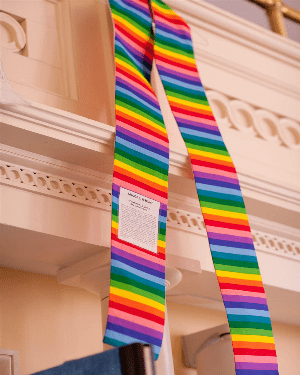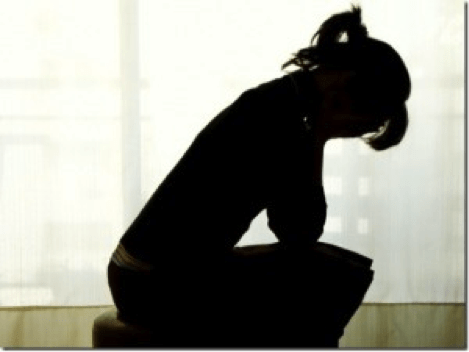
I’ve always loved telling my story. In college, my campus Christian group would pass out spiritual gifting inventories, and we’d take a test to help determine whether we had the gifts of prophesy, faith, teaching, healing, evangelism, service, etc. I never identified strongly with any of these gifts, so I made up my own category, telling myself I had the gift of testimony. It wasn’t that my story was remarkable; I was a goody-goody rule follower my whole life. I didn’t have a radical conversion story—just one of knowing aimlessness and loneliness until I found meaning and community among the followers of Jesus. I loved having the chance to speak my truth in a way that offered hope and pointed others toward the gospel.
Later in life, my story grew more interesting. I wrestled with depression, I survived a career failure and financial devastation, and I started to admit to myself that I was attracted to women. My church was happy to have me tell my story of how God was at work in the first two challenges. I even spoke publically, for a time, of what it was like to “struggle with unwanted same-sex attractions.” In all of these situations, I told my story honestly, exposing both my pain and my hope, and giving thanks to God through it all.
___________________________________________
My evangelical church valued me, and they valued my testimony—until I came to the conclusion that God was okay with me as a lesbian.
___________________________________________
My evangelical church valued me, and they valued my testimony—until I came to the conclusion that God was okay with me as a lesbian. Then, my story became a threat and a source of conflict. After coming out, I was told that I would no longer be allowed to preach, teach, or lead a small group. I tried to push back, explaining my process of hearing from God and encouraging them to rethink what they’ve been taught about gay people. I tried to work for change from inside my church, but three years later, I was tired, hurt, and losing hope. It was time to go.
 These experiences left me hungry to hear from others. I wondered if staying connected to Christianity was causing me more harm than good, but I couldn’t imagine abandoning my faith. I needed exposure to stories like mine: stories of queer women who held onto their faith. I needed to know that it was possible to have a healthy, life-giving, and affirming Christian faith.
These experiences left me hungry to hear from others. I wondered if staying connected to Christianity was causing me more harm than good, but I couldn’t imagine abandoning my faith. I needed exposure to stories like mine: stories of queer women who held onto their faith. I needed to know that it was possible to have a healthy, life-giving, and affirming Christian faith.
So, I went in search of stories. Through a social work research project, I interviewed other women who grew up in non-affirming Christian environments and described their current faith as “meaningful and affirming.” Many of these women were taught that gay people are the worst kind of sinners. They were kicked out of homes and churches, rejected by their families, removed from leadership, lectured, and even physically assaulted. They were told that God could not accept them. Still, they fought to keep their faith alive. Their stories are profoundly moving.
___________________________________________
I wondered if staying connected to Christianity was causing me more harm than good, but I couldn’t imagine abandoning my faith.
___________________________________________
Among the many things I learned from these women, two fascinating themes emerged from their stories. The first theme was the impact it had on them to stay silent about their sexual orientation. Some hid romantic relationships from others for years at a time. Others hid the fact that they identified as lesbian or bisexual – sometimes even from themselves. Often, it was coming to terms with how deeply their own silence was hurting them that finally led these women to come out to others—even when they knew the consequences would be severe.
 Renee grew up in a variety of evangelical and charismatic churches. She knew where her mother stood when it came to LGBTQ people; she’d heard her say disparaging things many times before. Still, Renee decided to come out to her mother because hiding her orientation felt like “living a lie.” She said, “I struggled for more than three years [with] how to come out to my mother. There were times where I mustered the strength, and I had a script in my head of what I could say, and I just couldn’t do it. I think the fear and anxiety really got to me. Then I thought I could do it in a letter. One day I tried to start it seventeen different times and I just couldn’t. Eventually, Renee was found out and her mother severed ties with her for over a year. They had an argument on her mother’s front porch because Renee was not allowed in the house.
Renee grew up in a variety of evangelical and charismatic churches. She knew where her mother stood when it came to LGBTQ people; she’d heard her say disparaging things many times before. Still, Renee decided to come out to her mother because hiding her orientation felt like “living a lie.” She said, “I struggled for more than three years [with] how to come out to my mother. There were times where I mustered the strength, and I had a script in my head of what I could say, and I just couldn’t do it. I think the fear and anxiety really got to me. Then I thought I could do it in a letter. One day I tried to start it seventeen different times and I just couldn’t. Eventually, Renee was found out and her mother severed ties with her for over a year. They had an argument on her mother’s front porch because Renee was not allowed in the house.
Laurie had been taught such negative things about gay people that she tried reparative therapy to change her orientation. While attending Bible college, she met with a pastor and a professional counselor to work on “overcoming” her attraction to women. Even then, after committing herself to celibacy, she was called into the office of the Dean of Women who told her that “Others have pointed you out to me. Even some of the teachers have questioned whether you are gay by the way you are—by the way you dress or the way you talk or walk.” Laurie couldn’t believe she could be in trouble for appearing too gay when she was following all their rules. “It floored me! Even if there’s nothing going on in my life, I can still be perceived as gay. This is ridiculous! And so, like usual, I drove everybody away.” She remembered thinking to herself, “’I am not going to tell anybody. I’m not going to deal with this with anybody. I’m submarining it all.’ It put me into a very deep depression, where I was up and down and struggling very much—very isolated, very alone.”
___________________________________________
A second theme that emerged from these interviews was the powerful ways that speaking their truth profoundly changed things for these women.
___________________________________________
Shame loves silence. Researcher Brene Brown says that shame is fear of disconnection; it is the fear that something about us makes us unworthy of love and belonging. Many of the women I interviewed suffered in silence for years at a time. It was only after coming out and finding supportive others that shame lost its power. Depression lifted, hope returned, and relationships flourished.
 A second theme that emerged from these interviews was the powerful ways that speaking their truth profoundly changed things for these women. They grew in self-respect as they were honest with others in the face of rejection. They grew in happiness as they found supportive relationships where they could be more fully themselves. Over time, they also saw change in their loved ones. Often, loved ones took significant steps towards acceptance, even if they never got to a place of being fully affirming. Rene’s mom still doesn’t approve of her daughter’s relationships, but they’ve tried to rebuild their own relationship while they disagree. Renee described her faith as “the healthiest it has ever been” because she can be honest about who she is. Laurie no longer lives in silence and isolation. She graduated from Bible college and came out weeks later. Although she was kicked out of her church, she is now a minister in a different denomination, able to communicate God’s love and acceptance to others.
A second theme that emerged from these interviews was the powerful ways that speaking their truth profoundly changed things for these women. They grew in self-respect as they were honest with others in the face of rejection. They grew in happiness as they found supportive relationships where they could be more fully themselves. Over time, they also saw change in their loved ones. Often, loved ones took significant steps towards acceptance, even if they never got to a place of being fully affirming. Rene’s mom still doesn’t approve of her daughter’s relationships, but they’ve tried to rebuild their own relationship while they disagree. Renee described her faith as “the healthiest it has ever been” because she can be honest about who she is. Laurie no longer lives in silence and isolation. She graduated from Bible college and came out weeks later. Although she was kicked out of her church, she is now a minister in a different denomination, able to communicate God’s love and acceptance to others.
These stories make for powerful testimony. They speak of a God who leads people out of darkness and into abundant living, a God who shows love to those the church rejected. They are redemption stories.
___________________________________________
These stories…speak of a God who leads people out of darkness and into abundant living, a God who shows love to those the church rejected. They are redemption stories.
___________________________________________
I still feel the pain of having my voice silenced. Some relationships were broken beyond repair, and I continue to grieve those which were lost. Still, telling my story has brought me healing. I found compassion for myself as the young woman who believed that she needed healing from homosexuality, and I took ownership of my own decisions to follow religious beliefs that offered certainty over compassion. I came to rejoice that that same young woman has found acceptance, love, and affirmation in a new faith context.
In addition, telling the stories of others has become a profound joy. I’ve been surprised to see how, even after such radical transformation and transition in my life, testimony remains my spiritual gift, a powerful tool to speak of humanity’s potential for evil and to point to the unending goodness of God.
___________________________________
AUTHOR BIO: Rachel is the author of Unnatural: Spiritual Resiliency in Queer Christian Women. She uses story to encourage Christians towards understanding and inclusion of LGBTQ people.
Read more articles from this issue, “Hearing the Voices of Peoples Long Silenced”: Gender Justice 2014!





Unbound Social